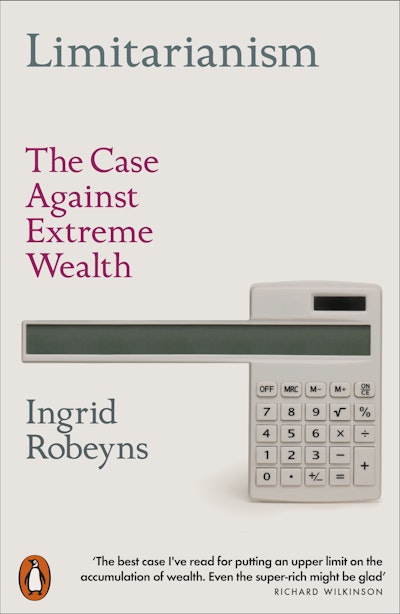- Published: 23 April 2025
- ISBN: 9781802060478
- Imprint: Penguin Press
- Format: Paperback
- Pages: 336
- RRP: $26.99
Limitarianism
The Case Against Extreme Wealth
- Published: 23 April 2025
- ISBN: 9781802060478
- Imprint: Penguin Press
- Format: Paperback
- Pages: 336
- RRP: $26.99
There is a limit beyond which additional wealth can’t do much to enhance its owner’s life or happiness. But our economic system generates fortunes far beyond any such limit. Ingrid Robeyns makes a convincing case that an upper limit on wealth would be good for society as a whole and even for the wealthy themselves
John Quiggin
The best case I've read for putting an upper limit on the accumulation of wealth. Even the super-rich might be glad if there was a finishing line!
Richard Wilkinson
A compelling case for limiting extreme wealth, along economic, political and moral lines ... This argument has never been more important, and this book is a persuasive call to action
Jayati Ghosh, Professor of Economics, University of Massachusetts Amherst
Powerful – a must-read
Thomas Piketty
Ingrid Robeyns has written an essential book from a radical point of view. It is high time someone asked the question, "Is there such a thing as having too much money?" Along with its corollary question, 'So what are we going to do about it?' Robeyns tackles both with deep knowledge, experience and empathy
Abigail Disney, filmmaker, philanthropist, and activist
An urgent, thought provoking treatise that is both a compelling critique of limitless inequality and an imaginative account of a world without the superrich
Peter Geoghegan
Effortlessly navigating between ethics, political theory, economics and public policy, Ingrid Robeyns’ nuanced and persuasive defence of limitarianism is also a much-needed manifesto for reimagining political institutions
Lea Ypi
Robeyns’ argument that top heavy wealth is sinking living standards for the many, spreading economic fear that authoritarians exploit is sound and her thoughtful ideas for reining in extreme wealth are provocative
David Cay Johnston, Pulitzer Prize winner
Many people accept that there is a threshold that no one should fall below. But few have thought that there is a threshold that no one should be free to soar above. In this wonderful book, Ingrid Robeyns presents a novel and nuanced set of arguments for just such an upper threshold. This is a model of how to bring rigorous analysis to bear on practical issues, and to do so in an engaging, humane and accessible way
Debra Satz
Robeyns proves that in a true democracy there are no rights without duties – no wealth without limits. Limitarianism offers a way to re-democratise wealth and thus re-socialise the richest 1%.
Marlene Engelhorn, co-founder of taxmenow
Limiting extreme wealth is an idea whose time has surely come and Ingrid Robeyns makes a powerful case for why this should be a priority for public and political debate. Limitarianism builds on what the epidemiology shows so clearly - inequality damages all of us and it needs to be tackled with the greatest urgency
Kate Pickett
Is it possible to meet the needs of all people within the means of the living planet? Definitely not in a world dominated by extreme wealth, as Ingrid Robeyns powerfully argues. This landmark book combines meticulous logic with compelling personal stories to draw everyone - from the super-rich to the super-riled - into one of the most critical public debates of our times. Read it.
Kate Raworth
A withering critique of the ethical, moral, and fiscal harms of unlimited wealth concentration . . . [This] caustic but balanced attack offers an equitable economic compromise
Kirkus Reviews
Perhaps the most blasphemous idea in contemporary discourse
George Monbiot
You might find yourself, as I did, underlining a sentence or three on every page, and adding exclamation points in the margin
Tim Adams, Observer
Provocative ... begs an interesting debate about society's future
The Times
Valuable, intriguing, provocative ... Robeyns poses a question that very rarely gets asked in mainstream politics ... How much is too much?
Guardian
A landmark ... gripping, riveting, vivid ... We need to embrace, as Robeyns so compellingly argues, limits on income and wealth.
Inequality.org
She’s done the maths. We need Limitarianism. Urgently
Irish Examiner
Gripping ... we need to embrace a limitarian ethos and free our world once and for all from the fabulously rich.
Sam Pizzigati, Counterpunch
One of the most talked-about books to the moment … Limitarianism floats the heretical idea that fixing society isn’t just about saving the poorest from destitution, but about putting a cap on how much the richest are able to own
Spectator
Timely, disquieting, compelling … Limitarianism questions the idea that individual wealth is ever individual
Atlantic
A provocative consideration of extreme wealth accumulation
New Yorker
Original … A fresh take … a thought-provoking read for all those interested in inequality
Lucas Chancel, Nature
The current Buddha of the cap-the-rich movement is Ingrid Robeyns, a professor of ethics at Utrecht University and the author, in January, of Limitarianism: The Case Against Extreme Wealth. It’s a bracing, scolding read
Ian Brown, Globe and Mail
[A] revolutionary volume ... Limitarianism is a thoughtful blueprint for the world so many of us want to live in—one where capitalism is curbed and greed is limited
Adrienne Westenfeld, Esquire's 10 best nonfiction books of 2024
Refreshingly, as well as exposing today’s dire situation, Limitarianism also suggests steps that individuals – me, you – can take to address it
History Today *Books of the Year*
In a democratic society, we should argue about how much inequality is (un)reasonable. Limitarianism can help that conversation
The Conversation *Books of the Year*
This book has an argument in it that might technically be considered provocative or radical, but to me it seems like common sense
Jia Tolentino, New Yorker *Books of the Year*
